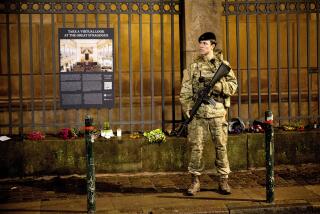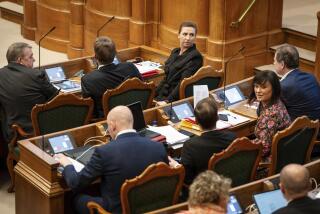Anger Over Cartoons of Muhammad Escalates
- Share via
PARIS — Protests erupted in the Muslim world and militants issued threats against Europeans on Thursday in response to the publication in Western media of controversial caricatures of the prophet Muhammad.
Debate over the drawings, which were first published in September by a Danish newspaper, is being seen as a collision between freedom of expression and religious sensitivities in European nations, where Muslim populations have struggled to fit in.
The caricatures have appeared recently in newspapers in France, Germany, Italy, Spain, the Netherlands and even Jordan.
Muslims, who consider any depiction of God and the prophets blasphemy, are outraged by the caricatures, one of which shows Muhammad with a bomb as a turban. Another shows the prophet standing on a cloud as he tells a group of suicide bombers that paradise has run out of the virgins said to await martyrs upon their death.
The conflict heated up on multiple fronts Thursday. In the Gaza Strip, masked Palestinians fired weapons into the air as they surrounded an office of the European Union and a French cultural center. Two Palestinian militant groups threatened to retaliate against the newspapers by kidnapping European citizens and targeting churches and European offices.
A Jordanian weekly that ran the cartoons with a plea to Muslims to “be reasonable” fired its editor, withdrew the edition and faced possible sanction from the government, Associated Press reported.
In Paris, the tabloid France Soir abruptly fired its managing editor for reprinting the caricatures in Wednesday’s edition, the cover of which carried the paper’s own cartoon of Muhammad alongside Christian, Jewish and Buddhist holy figures. “Don’t complain, Muhammad, we’re all being caricatured here,” the Christian God says.
Tunisia and Morocco banned the sale of copies of France Soir.
In Jakarta this morning, Muslims protested in the lobby of a high-rise that houses the Danish Embassy, pelted the building with eggs and burned the Danish flag outside.
Editorialists, political leaders and advocates of press freedom said the Muslim backlash, which has included boycotts, death threats and flag burnings, jeopardized democratic rights.
“The reaction in Muslim countries shocks me because it confirms the weight that radical Islam has acquired,” said Patrick Chappatte, a cartoonist quoted in the Swiss newspaper Le Temps. “A real totalitarianism is at work in the world and wants to impose its views not only on Arab Muslims, but on the West. The same way that they veil women, Islamic radicals want to veil cartoons in the press.”
But Muslim leaders accused European media of provoking strife by humiliating Islam. “Freedom of expression cannot be the freedom to lie,” said Dalil Boubakeur, imam of the Mosque of Paris and president of the French Council of the Muslim Faith. “The prophet did not found a terrorist religion, but on the contrary, a religion of peace.”
Afghan President Hamid Karzai said the furor had exacerbated religious tensions.
“Any insult to the holy prophet -- peace be upon him -- is an insult to more than a billion Muslims,” Karzai said in a statement.
Western leaders responded gingerly. They were mindful that the issue could unleash violence reminiscent of the assassination of Dutch filmmaker Theo van Gogh, who was killed in 2004 by a Dutch Muslim extremist angered by the filmmaker’s depictions of Islam.
Some political figures called for restraint by the media. The press has to “deal with what it has gotten into,” German Interior Minister Wolfgang Schaeuble said. U.N. Secretary-General Kofi Annan said the press must respect religion.
Annan “is concerned over the controversy that has been created by the publication of the Danish cartoons,” United Nations spokesman Stephane Dujarric said. “He believes that the freedom of the press should always be exercised in a way that fully respects the religious beliefs and tenets of all religions.”
But many European leaders said that democratic principles outweighed the risk of offending religious sensitivities.
“We must defend freedom of expression,” French Interior Minister Nicolas Sarkozy said. “And if I had to choose, I prefer the excess of caricature over the excess of censure.”
Sarkozy said he was surprised by the firing of Jacques LeFranc, managing editor of France Soir. The move was ordered by the paper’s owner, an Egyptian-born Catholic named Raymond Lakah, and announced in a news release along with an apology “to the Muslim community and anyone who was shocked or angered.”
Nevertheless, Thursday’s edition of France Soir devoted its front pages to a feisty defense of its publication of the caricatures. The cover showed a photo of bearded Muslim men burning a Danish flag. In a reference to the renowned 18th century author who mocked religious and political hypocrisy, a headline read, “Help Us, Voltaire: They Have Gone Mad!”
The fired editor warned that he would fight his dismissal. Le Monde, the influential French daily, published an editorial Thursday asserting that French law permitted religions to be “freely analyzed, criticized and even subjected to ridicule.”
In Germany, the centrist newspaper Die Welt asked its readers whether “cartoons should be published which might hurt religious feelings.” Among almost 20,000 participants, 56% voted for “should be published” and 42.1% disagreed. Fewer than 2% said they had no opinion.
Accusations of intolerance on both sides reflect Europe’s difficulties in absorbing a fast-growing Muslim population that is experiencing a surge of fundamentalism and struggling with alienation and discrimination.
The case also shows the profound differences that exist in relationships among the state, religion and media. Arab leaders have demanded that European governments sanction the journalists. Leaders in Denmark and other countries say that censorship is unacceptable and that the government cannot be held responsible for what appears in the media.
The 12 caricatures were first published in the daily Jyllands-Posten in September, leading to months of wrangling between the Danish and Arab governments. The editors of the newspaper have said they are sorry if anyone was offended, but they have defended the publication of the images.
On Thursday, Danish Prime Minister Anders Fogh Rasmussen told an Arabic television channel that he had summoned foreign diplomats to a meeting today aimed at calming tensions.
“We are talking about an issue with fundamental significance to how democracies work,” Rasmussen said.
Times staff writers Maggie Farley at the United Nations, Laura King in Gaza City and Christian Retzlaff in Berlin contributed to this report.
More to Read
Sign up for Essential California
The most important California stories and recommendations in your inbox every morning.
You may occasionally receive promotional content from the Los Angeles Times.










